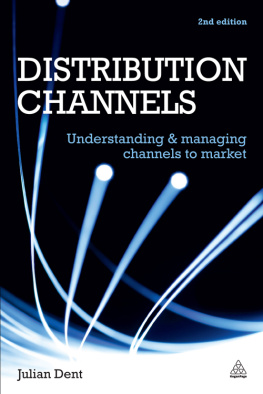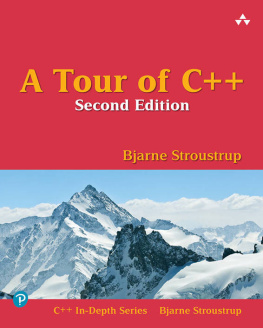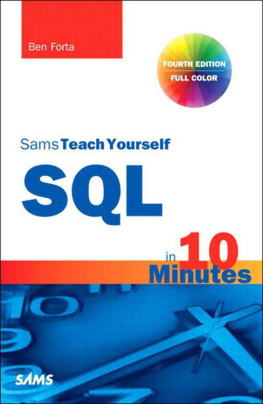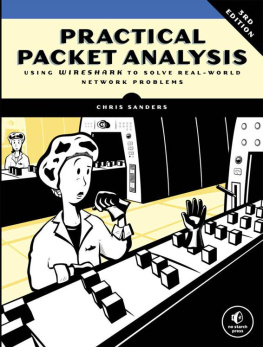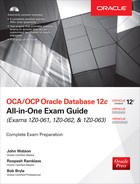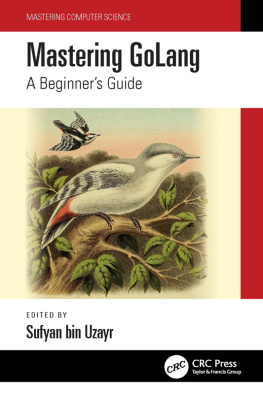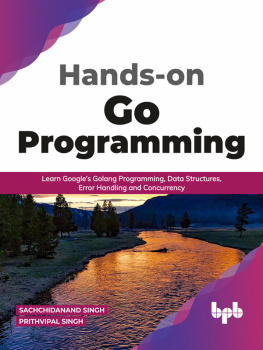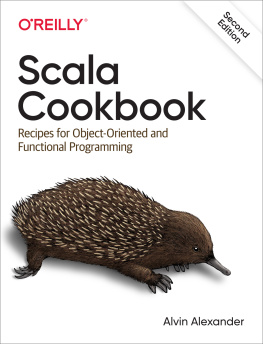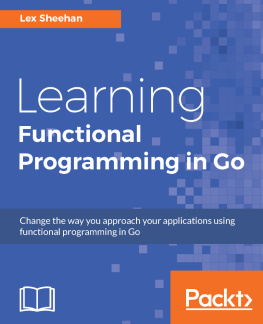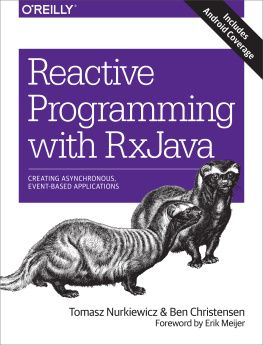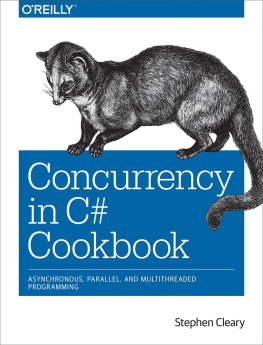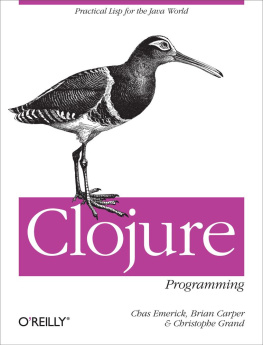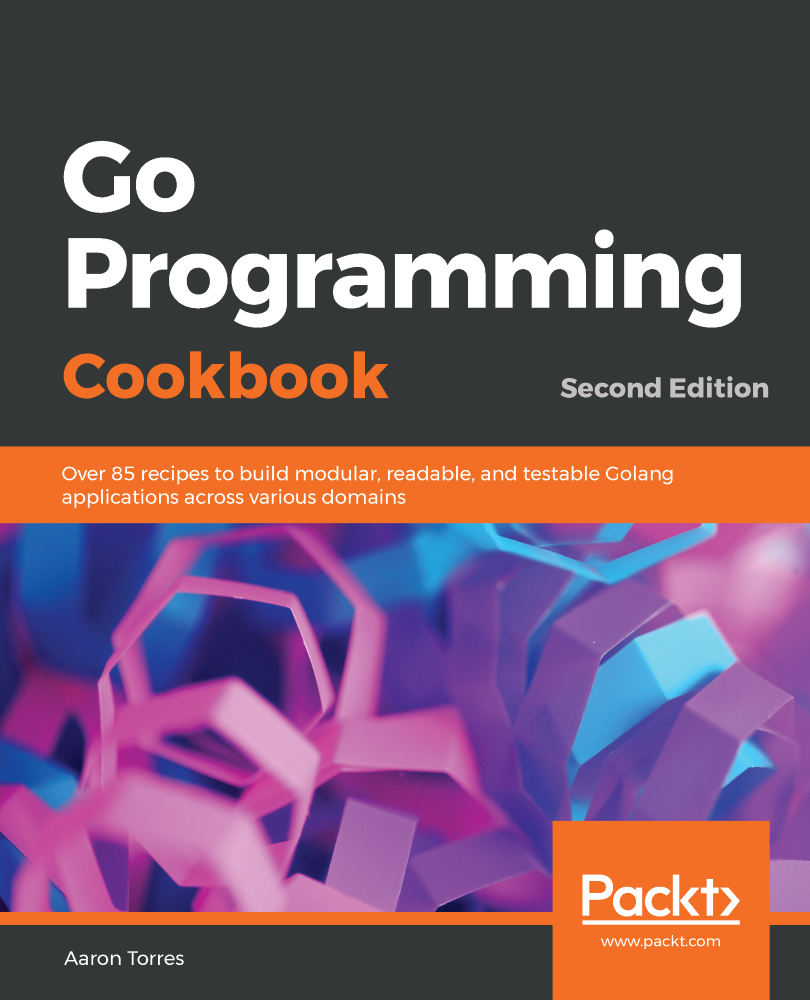
Go Programming Cookbook
Second Edition
Over 85 recipes to build modular, readable, and testable Golang applications across various domains
Aaron Torres

BIRMINGHAM - MUMBAI
Go Programming CookbookSecond Edition
Copyright 2019 Packt Publishing
All rights reserved. No part of this book may be reproduced, stored in a retrieval system, or transmitted in any form or by any means, without the prior written permission of the publisher, except in the case of brief quotations embedded in critical articles or reviews.
Every effort has been made in the preparation of this book to ensure the accuracy of the information presented. However, the information contained in this book is sold without warranty, either express or implied. Neither the author, nor Packt Publishing or its dealers and distributors, will be held liable for any damages caused or alleged to have been caused directly or indirectly by this book.
Packt Publishing has endeavored to provide trademark information about all of the companies and products mentioned in this book by the appropriate use of capitals. However, Packt Publishing cannot guarantee the accuracy of this information.
Commissioning Editor: Amey Varangaonkar
Acquisition Editor: Shahnish Khan
Content Development Editor: Rohit Kumar Singh
Technical Editor: Romy Dias
Copy Editor: Safis Editing
Project Coordinator: Vaidehi Sawant
Proofreader: Safis Editing
Indexer: Tejal Daruwale Soni
Production Designer: Aparna Bhagat
Graphic Coordinator: Alishon Mendonsa
First published: June 2017
Second edition: July 2019
Production reference: 1190719
Published by Packt Publishing Ltd.
Livery Place
35 Livery Street
Birmingham
B3 2PB, UK.
ISBN 978-1-78980-098-2
www.packtpub.com
To my wife, Kaylee, and my daughters, Hazel, Oleander, and Aranea. Thank you for your patience, love, and support. This book would not be possible without you.
Packt.com
Subscribe to our online digital library for full access to over 7,000 books and videos, as well as industry leading tools to help you plan your personal development and advance your career. For more information, please visit our website.
Why subscribe?
Spend less time learning and more time coding with practical eBooks and Videos from over 4,000 industry professionals
Improve your learning with Skill Plans built especially for you
Get a free eBook or video every month
Fully searchable for easy access to vital information
Copy and paste, print, and bookmark content
Did you know that Packt offers eBook versions of every book published, with PDF and ePub files available? You can upgrade to the eBook version at www.packt.com and as a print book customer, you are entitled to a discount on the eBook copy. Get in touch with us at customercare@packtpub.com for more details.
At www.packt.com , you can also read a collection of free technical articles, sign up for a range of free newsletters, and receive exclusive discounts and offers on Packt books and eBooks.
Contributors
About the author
Aaron Torres received his master's degree in computer science from the New Mexico Institute of Mining and Technology. He has worked on distributed systems in high-performance computing and in large-scale web and microservices applications. He currently leads a team of Go developers that refines and focuses on Go best practices with an emphasis on continuous delivery and automated testing.
Aaron has published a number of papers and has several patents in the area of storage and I/O. He is passionate about sharing his knowledge and ideas with others. He is also a huge fan of the Go language and open source for backend systems and development.
About the reviewer
Eduard Bondarenko is a software developer living in Kyiv, Ukraine. He started programming using BASIC on ZXSpectrum a long time ago. Later, he worked in the web development domain. He has used Ruby on Rails for over 8 years. Having used Ruby for a long time, he discovered Clojure in early 2009, and liked the simplicity of language. Besides Ruby and Clojure, he is interested in Go and ReasonML development.
I want to thank my wonderful wife, kids, and parents for all the love, support, and help they are giving to me.
Packt is searching for authors like you
If you're interested in becoming an author for Packt, please visit authors.packtpub.com and apply today. We have worked with thousands of developers and tech professionals, just like you, to help them share their insight with the global tech community. You can make a general application, apply for a specific hot topic that we are recruiting an author for, or submit your own idea.
Preface
Thank you for choosing this book! I hope it will be a handy reference for developers to quickly look up Go development patterns. It is meant to be a companion to other resources and a reference that will hopefully be useful long after reading it once. Each recipe in this book includes working, simple, and tested code that can be used as a reference or foundation for your own applications. The book covers a range of content from basic to advanced topics.
Who this book is for
This book is aimed for web developers, programmers, and enterprise developers. Basic knowledge of the Go language is assumed. Experience with backend application development is not necessary, but may help understand the motivation behind some of the recipes.
This book serves as a good reference for Go developers who are already proficient but need a quick reminder, example, or reference. With the open source repository, it should be possible to share these examples quickly with a team as well. If you are looking for quick solutions to common and not-so-common problems in Go programming, this book is for you.
What this book covers
, I/O and Filesystems, covers common Go I/O interfaces and explores working with filesystems. This includes temporary files, templates, and CSV files.
, Command-Line Tools, looks at taking in user input via the command line and explores processing common datatypes such as TOML, YAML, and JSON.
, Data Conversion and Composition, demonstrates methods for casting and converting between Go interfaces and data types. It also showcases encoding strategies and some functional design patterns for Go.
, Error Handling in Go, showcases strategies to handle errors in Go. It explores how to pass errors, handle them, and log them.
, Network Programming, demonstrates usage of various networking primitives such as UDP and TCP/IP. It also explores Domain Name System (DNS), working with raw email messages, and basic
Next page

